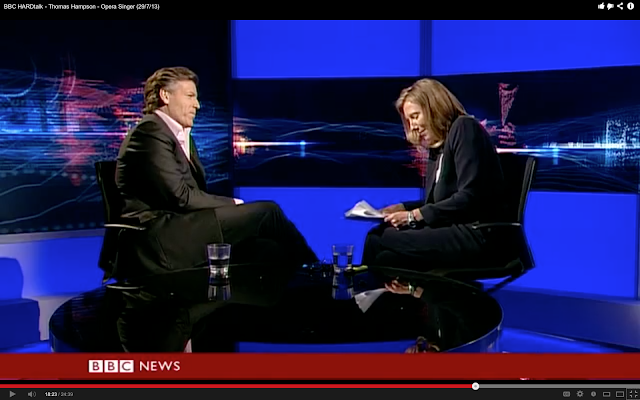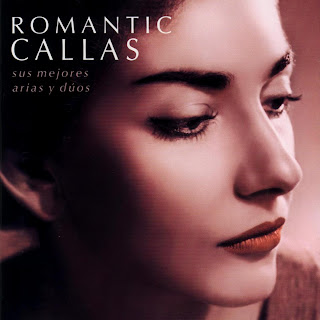Thomas Hampson on BBC HARDtalk
This recent interview (29 July 2013) given by Thomas Hampson to Sarah Montague on BBC HARDtalk has been making the rounds on social media. Check here for the full interview (~25 minutes long).
The intention of this isn't to weigh in too heavily but more just to get it out there since it's a high profile televised interview relating to opera. It's interesting regardless of how one feels about Thomas Hampson as a person or performer, or the BBC, Sarah Montague, or HARDtalk as media.
It does feel as though Montague came into the interview with an agenda, whether of her own making or of the the BBC producers looking for attention. That said, in a way that gave Hampson something good to push back against. As opera lovers, performers, etc. we do have to face the fact that opera can be expensive to put on and attend, that there is a challenge bringing new, especially younger viewers in, and that it is incredibly under-attended as a whole. Without raising the debate of "is opera declining," it's fair to say that those are at the very least challenges it faces.
Hampson's views offer perspective on a whole variety of issues: opera vs. popular music, how opera should be approached, how it is viewed, how to change the way its viewed, aesthetics, etc. At times I felt that the acuity of his ideas actually undermines his points. His vision actually does lay out why everyone should be interested in opera and why it's valuable to get involved in an art form rather than be a passive consumer. His explanation, though, sometimes veers to exactly the kind of language that many perceive as "elite." The basic idea though, I can't argue with. Part of what I love about opera is exactly the closed-world aspect of it - getting in conversations with operaphiles who jabber about obscure terminology and singers late into the night. And really, that's no different than sports, TV shows, or anything else in culture. The difference, as Hampson points out, is that opera is an art form that has endured for hundreds of years because of its ability to portray timeless human relationships and transmute the ineffable feelings they inspire into something tangible through music. Surely that's something worth investing our time in getting to know.
The intention of this isn't to weigh in too heavily but more just to get it out there since it's a high profile televised interview relating to opera. It's interesting regardless of how one feels about Thomas Hampson as a person or performer, or the BBC, Sarah Montague, or HARDtalk as media.
It does feel as though Montague came into the interview with an agenda, whether of her own making or of the the BBC producers looking for attention. That said, in a way that gave Hampson something good to push back against. As opera lovers, performers, etc. we do have to face the fact that opera can be expensive to put on and attend, that there is a challenge bringing new, especially younger viewers in, and that it is incredibly under-attended as a whole. Without raising the debate of "is opera declining," it's fair to say that those are at the very least challenges it faces.
Hampson's views offer perspective on a whole variety of issues: opera vs. popular music, how opera should be approached, how it is viewed, how to change the way its viewed, aesthetics, etc. At times I felt that the acuity of his ideas actually undermines his points. His vision actually does lay out why everyone should be interested in opera and why it's valuable to get involved in an art form rather than be a passive consumer. His explanation, though, sometimes veers to exactly the kind of language that many perceive as "elite." The basic idea though, I can't argue with. Part of what I love about opera is exactly the closed-world aspect of it - getting in conversations with operaphiles who jabber about obscure terminology and singers late into the night. And really, that's no different than sports, TV shows, or anything else in culture. The difference, as Hampson points out, is that opera is an art form that has endured for hundreds of years because of its ability to portray timeless human relationships and transmute the ineffable feelings they inspire into something tangible through music. Surely that's something worth investing our time in getting to know.




Comments
Post a Comment